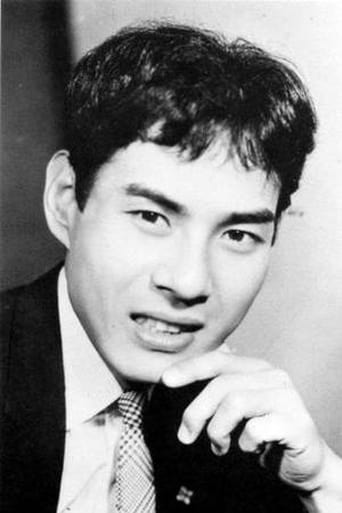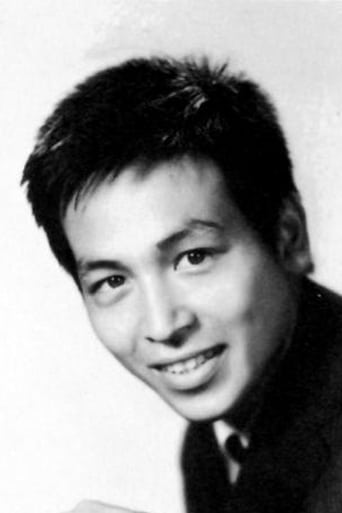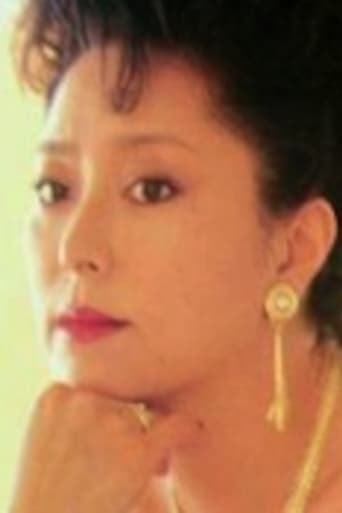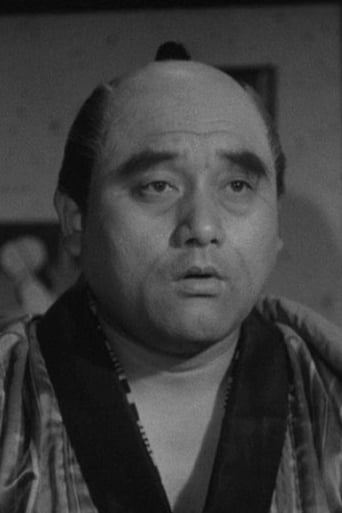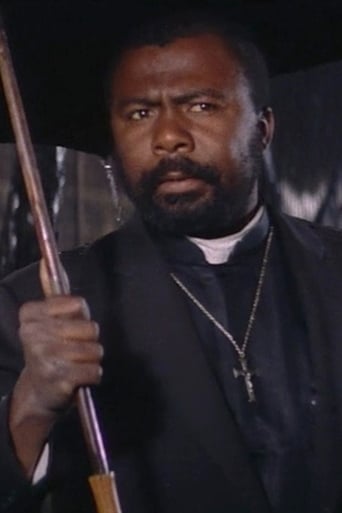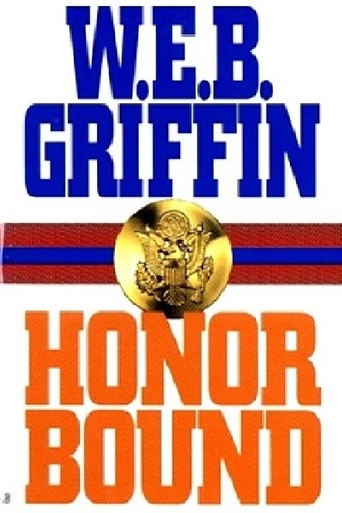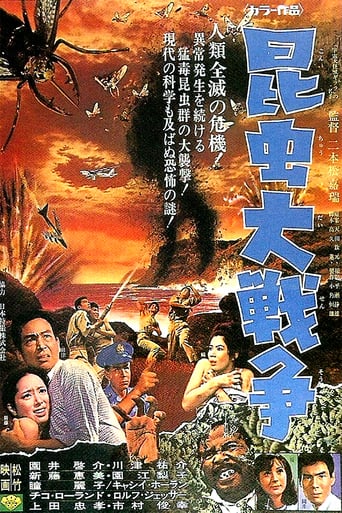
A group of military personnel transporting a hydrogen bomb are left to figure out how and why swarms of killer bugs took down their plane; the answer is more deliriously nihilistic, and convoluted, than you could imagine. Also known as War of the Insects, GENOCIDE enacts a cracked doomsday scenario like no other.
Similar titles
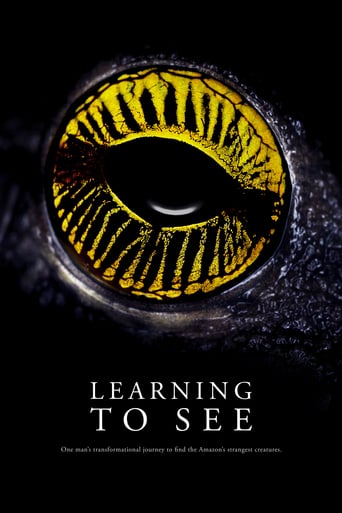
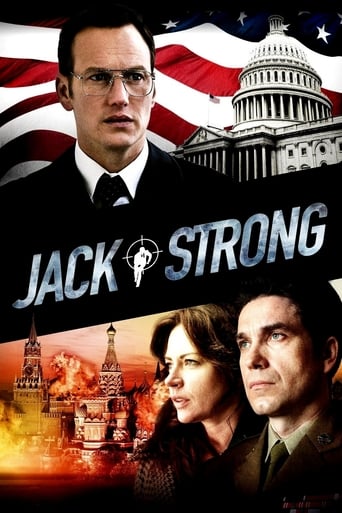
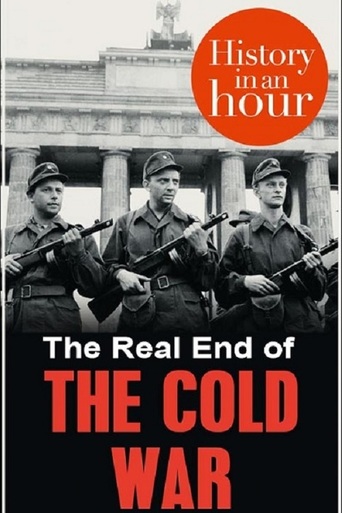
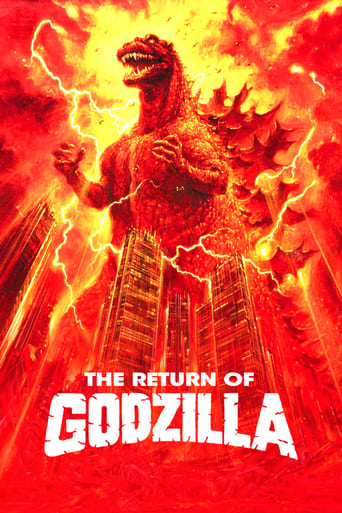

Reviews
Slow pace in the most part of the movie.
Perfect cast and a good story
It's the kind of movie you'll want to see a second time with someone who hasn't seen it yet, to remember what it was like to watch it for the first time.
By the time the dramatic fireworks start popping off, each one feels earned.
A group of military personal investigate the crash of an army plane on a remote island. They uncover an evil plot by lethal insects to bring about the end of the human race. Director Kazui Nihonmatsu relates the intricate and absorbing story at a constant pace, grounds the fantastic premise in a believable everyday reality, and adroitly creates and maintains an extremely grim and uncompromising take-no-prisoners nihilistic tone. Susumu Takaku's harsh script makes a bleak point on how mankind's self-destructive nature will bring about his own ruination. This film further benefits from several interesting hateful characters: Kathy Horan as bitter and vengeful holocaust survivor Annabelle, Ralph Jesser as the ruthless Lt. Gordon, and Chico Roland as the unhinged Charlie. The surprise bummer ending packs a startling punch. A solid little Japanese sci-fi/horror movie.
More or less I am sort of responding to the first review that was done in 2009, which was very negative of the film. I think that the film is interesting, and watching it you realize why the film may never have been released overseas.Many years ago, when I was in College, there was a white individual, who after watching a black exploitation film made a very rude comment, especially considering the one black female in the room. "Now I understand the black mentality". Sadly, in watching this film made in 1968, one could almost say the same exact thing. In the film, the Americans are played as if an occupying force in Japan, at least on this Island. the Americans, especially with the lead American character, one could almost say he is portrayed as some kind of Nazi type official, though he does not go and execute people. A little bit is made of the War that the United States fought Japan in the Pacific, though now as one of the Japanese characters does say in the film, and paraphrasing, "now we're friends. Yet watching the film, the Japanese seem to be portrayed as innocent victim. Any Japanese person who is bad in the film,, is actually working for the Communists. Much of course is made of nuclear war, and of course the blame somehow will be put on the Americans, and perhaps in this case somewhat understandably. But however here is the kicker, Their is this one woman, who looks way to young for her to have been a young victim of the holocaust, as she is somehow shown to be somewhat sexy. Of course, she is the one behind some experimentation of the insects, and working with the communists, wants to get revenge on the world for what happened to her. Of course in this case it is the Germans who are portrayed as the villains who did this to her, but to blame another country, and not your own, as the Japanese creators of this movie have done, and it is well documented that Japan was just as bad as Nazi Germany was, and many POW's were treated far worse by the Japanese than the Germans. In some ways, what happened to her in world war II is somehow made to equal what happened to the Japanese in WWII with the dropping of the atomic bomb, but of course there is no mention in this movie of the atrocities that Japan was responsible for. Japan is only shown as innocent victim of American aggression. Also of course highlighted, with the participation of Chico Rolands, a black actor who it would be interesting to know more about, and the alleged racism that is shown in this film by his American white superiors. One amazing scene certainly demonstrates that. Merits of the film are that it is rather suspenseful, and in many cases you do care about some of the characters. One person here gives his life in what is rather moving, and of course the way he dies for what is a greater good. Also the last image of the film of someone in a boat was touching.
GENOCIDE (1968) is a Japanese sci-fi movie with an apocalyptic theme and a mix of intriguing elements that culminate in a rather bleak denouement. I don't want to give away any of the twists, so suffice it to say that a series of separate experiments involving poisonous insects by a pair of disparate characters fuses with a plot about an American H-bomb that's been accidentally dropped—intact—on a remote Japanese island and is the subject of a frenetic search by American officers and shady local characters with ulterior motives of their own. What I found most significant about this film is the presence of so many non-Japanese characters, including an arrogant American Colonel (played by Ralph Jesser), a black American airman named Charly (Chico Roland), and Annabelle (Kathy Horan), a blonde from Eastern Europe with deep emotional scars from WWII. The majority of scenes feature interaction with non-Japanese characters and the tensions between the Japanese and the Americans are quite palpable, much more so than in most Japanese films I've seen set in the postwar era. In the Japanese-language/English-subtitled edition which I watched for this review (released by Criterion), all the characters speak Japanese to each other and all are post-dubbed by Japanese voice actors. Even inside the plane, the Americans speak only Japanese to each other. This is not always the case with Japanese movies featuring non-Japanese characters. For instance, I've seen Chico Roland in other movies, including Koreyoshi Kurahara's BLACK SUN (1964), and he speaks only English in that one. And in numerous kaiju (giant monster) movies, there are scenes with American crew members or scientists and they often speak English to each other (albeit sometimes dubbed by Japanese voice actors speaking heavily accented English).The plot of GENOCIDE is rather complicated but is deftly told in a compact 84 minutes, with all the different tangents coming together for quite a suspenseful finale. The Americans are not only eager to find the missing H-bomb, but are also intent on finding out who—or what-- killed two of the American crew members. The local police on the island take custody of an insect collector named Joji (Yusuke Kawazu) who is in possession of a watch that belonged to one of the crewmen. Joji is married to a local girl, Yukari (Emi Shindo), but is having an affair with Annabelle. Joji's employer, a biologist named Dr. Nagumo (Keisuke Sonoi), comes to the island to try to aid Joji's efforts to prove his innocence and help with the case any way he can. He becomes the nominal hero of the piece. Annabelle experiments with insects and may have something to do with the strange, unpredictable behavior of insects in the area, including a cloud of them that enveloped the American bomber plane and brought it down. Things heat up with various characters in the course of the narrative and Charly, the black airman wounded in the crash of the plane carrying the bomb, becomes the cruelly-treated pawn of the various factions in conflict on the island. Eventually, we learn that the insects have an agenda of their own.There are some special effects sequences, chiefly involving obvious miniatures representing the planes seen in the film and the insect "clouds" that attack them. There are some miniature sets of structures on the island, although most outdoors scenes were shot on location on an actual island, with indoor scenes done in studio sets. The insect action seems to be done mostly with live insects, which must have been quite a chore for the crew to handle, although the scenes are quite effective. One extremely harrowing sequence involves the young couple, Joji and Yukari, trapped in a hut under attack by the insects. There are frequent closeups of insects at work, including quite a few gruesome shots of insects biting flesh or leaving eggs inside the skin or organs of human victims. I don't know how much special effects work was involved in these shots, but they're all quite convincing. Viewers who get freaked out by these kinds of images should avoid this film.There are distinct anti-nuclear and anti-war sentiments expressed throughout the film and a disgust with the way U.S.-Soviet confrontations impact negatively on everyone else. Memories of World War II are frequently invoked. Some of the characters seem to have been designed purely to voice certain sentiments heard in the film. The fast pace of the narrative keeps us from dwelling on that problem too much. The ending may not be a conclusive one, although I think that might have been the point. This isn't a fun film like something you'd see in the Godzilla and Gamera series of the time or, say, THE GREEN SLIME, which came out a month later and offers its own distinct pleasures, but it is compelling and much harder-edged than the average Japanese sci-fi film of the 1960s. Some may find it disturbing, but I'd definitely recommend it as a unique and unusual viewing experience for fans of Japanese genre films.
This is a bad movie and I'm going to try and make this a bland as possible so you don't think there is any reason to see the film.Huge cloud of bees brings down a bomber carrying an atomic bomb over an island near Japan. Some of the crew escapes and makes it to the island where they are killed by the insects. One of the local men is charged with the men's murder. Through a long winding chain of events it transpires the bees are a new species that were being bred by a mad scientist to get revenge on Germany for what happened during World War 2. (There's more but trust me you don't want to know) Disaster of a film is a kin to the horrible eco-films (Last Days of Planet Earth) Japan turned out in the 1970's. These were big on having a point but small on any real plot. Here the film drones on with lots of talk and not much happening. Sure there is two late in the game bee attacks but it doesn't make it worth sitting through the preceding 80 minutes. A dreadful film in the unfun way that only Japanese scifi films can be.2 out of 10 because the two plane sequences at either end of the film are screamingly funny for all of the wrong reasons.(However they are not a reason to watch this movie)
Top Streaming Movies













